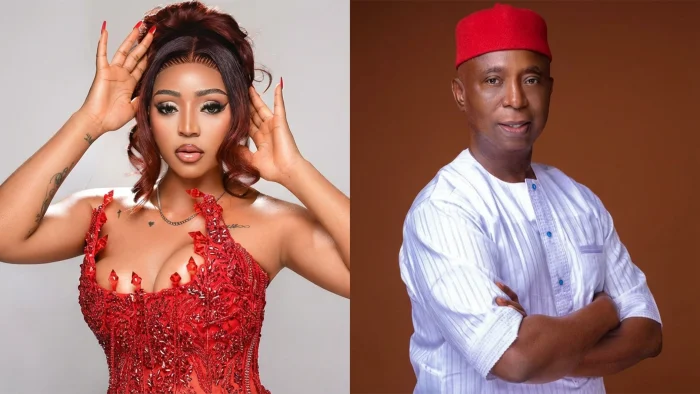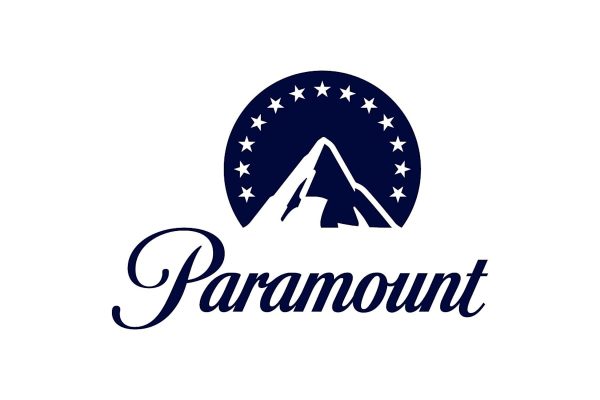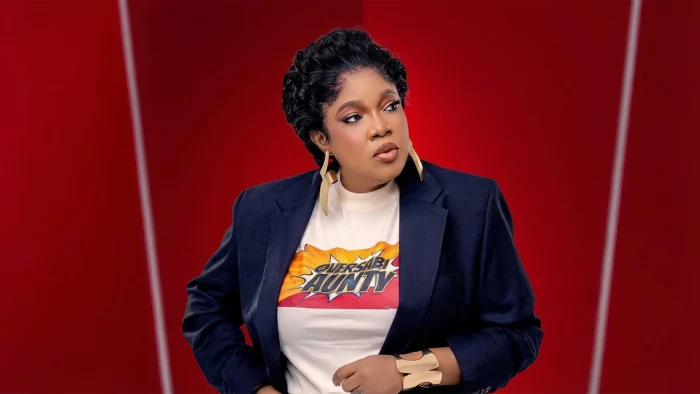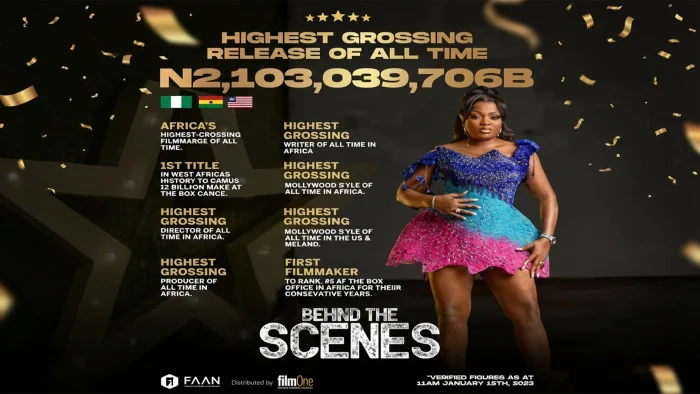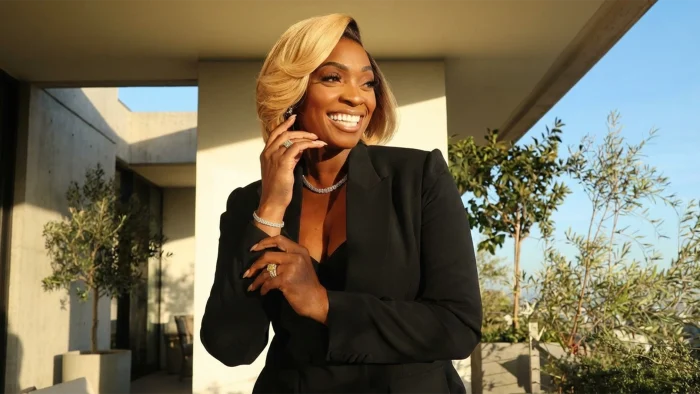- Keeping up with the Nwokos: Regina Daniels confirms warrant on family after brother’s arrest over alleged $40k theft
- Paramount sues in hostile bid to buy Warner Bros Discover
- Oversabi aunty hits 863m in sales, becoming top two highest-grossing titles of 2026
- Funke Akindele’s Behind the Scenes crosses ₦2bn, sets new Nollywood record
Nigerians are known for their resilient and creative spirit even during uncomfortable times. Recall legendary Fela’s song, ‘Suffering and Smiling’, which was a critical assessment of the socio-political scene of the country in the 80s?
[ad]
Over the years, Nigerians have cleverly woven such words as ‘we move’, ‘Japa’, ‘Sapa’ and ‘Soro soke’, ‘Jeun Soke, Jeun Sapo’ amid so many others, into the country’s narrative. And each slang has sent a message that helped people navigate troubled times and problems.
And now: ‘No gree for anybody’ has been added to the lexicon.
Most of these slangs are derived from comedies, skits, songs and films, and they reflect the dynamic language culture of Nigerians, showcase the vibrancy and adaptability of our linguistic landscape that reflect deeper concerns of the political clime and highlighting the psychological and mental state of the average Nigerian.
The prevailing slangs showcase the dynamic and vibrant language culture of Nigerians. One such term is ‘Omo’, which has effortlessly been woven into various moments of the day, conveying diverse emotions and reactions. Its versatility makes it a staple in daily discourse.
Another widely used slang is ‘Opor’, a term that transcends its literal translation of “plenty.”It signifies abundance or something exceeding expectations. When faced with situations that pass the norm, Nigerians aptly express it with a resounding ‘Opor’.
‘Wahala’ takes center stage as a ubiquitous term used to denote trouble or challenging situations. Whether anticipating the infamous ‘December wahala’ or responding to someone causing undue stress, this slang captures the essence of life’s complications..
In navigating tough situations, Nigerians turn to ‘Ewee’. This term expresses the difficulty or toughness of handling specific challenges. It encapsulates the resilience required when faced with tasks or circumstances that seem insurmountable. If somebody says send your ‘aza’, it means send your account number.
‘Sope Otilo’ adds a touch of humour to the lexicon, especially in response to unexpected or amusing situations. Its playful usage enhances the linguistic landscape, injecting a sense of lightness into daily interactions.
Burna Boy’s coined phrase, ‘Las las, na everybody go chop breakfast’, has become a quirky announcement of relationship breakups or rejections. Its popularity extends beyond the music scene, making it a relatable expression in personal narratives.
‘Help help me, e dey carry me dey go where I no know’ captures the essence of confusion or feeling lost in a particular situation. This phrase conveys the disorientation that can accompany unexpected twists in life.
‘Lori iro’ comes into play when someone is caught in the act of telling lies or deceiving others. It serves as a straightforward response, exposing dishonesty and reinforcing the importance of truthfulness.
Finally, ‘Shey you dey whine me ni?’ poses a questioning phrase seeking clarity on whether someone is trying to deceive or play games. It encapsulates the skepticism that arises when intentions are unclear.
While currently the slang dominating and gain stance in the sphere of the #Newyear 2024, is, No Gree for anybody. This latest lexicon has become so popular among netizens that even the police relations officers have come out to speak about its intention, even the military has also taken a cue from its relevance to the masses, and some elites have found a way to act upon its deeper meaning. Amidst all these, Nigerians continue to create different memes, gifs, about it and its usage continue to grow in leaps and bounds, developing in context and meaning.
While in many cases, the different slangs used at different times have served as a Comic relief from the current realities, it is otherwise a reminder that the people are not entirely dumb to what is going, or what can be done, but we are Nigerians, we usually find a way, and will always get a way to be where we should be. In Kelly Clarkson’s voice, ‘what doesn’t kill you makes you stronger’ becomes a theme song in the current dispensation.
Over the past five years or so, we have become used to these various slangs or catch phrases, therefore, we deem this relevant to have a critical look at them, and at the point of time they were used, what was the motive behind their creation?
What is their relevance to the current situation then? And did this slang achieve anything positive during the course of each usage?
We Move or we Meuvvvve
Made more popular, by the former vice president, Professor Yemi Osinbajo, clearly in his words then; For the benefit of young people in this country, wherever you are, whatever it is that you are doing, keep moving, don’t look back, you will win eventually, keep moving ahead, whatever the situation, we move, whatever the situation we move, we meuvvvve!
The ‘Muevvvvve’ slang originated from BBNaija contestant Vee. In a disagreement with Neo on the show, she asked him to move from the door. Her foreign accent transformed ‘Move’ into ‘Mueveee’, and Nigerians embraced it.
The slang serves as a motivational phrase, encouraging individuals to persevere and take action, especially in challenging situations. When facing adversity, one can accept their fate and choose to ‘muevvvvve!’
Japa
Exploring the quest for a way out and a better life abroad has taken an apprehensive tone in recent years. The term ‘Japa’, derived from Yoruba, meaning ‘to run, flee, or escape,’ captures the aspirations of young Nigerians seeking permanent relocation. This phenomenon reflects economic hardships triggering a surge in the desire for improved living standards overseas.
The term, originating from Naira Marley’s 2018 song, has become a cultural marker for discontent among Nigeria’s youth. Femi Odugbemi, producer of the series ‘Movement Japa’, notes the complex motivations, citing not only the pursuit of a better life but also escaping a system marked by failure and corruption. Various triggers, such as the Lekki Shooting in 2020, have intensified this drive, with socioeconomic factors playing a crucial role in migration decisions.
As young Nigerians weigh the pros and cons, the potential consequences on healthcare, education, and nation-building come to the forefront, emphasising the importance of addressing systemic issues for a sustainable future.
The concluded 2023 elections in Nigeria further fueled discussions by many disgruntled individuals about the outcome and around emigration, underscoring the need for positive change to retain the country’s youth and build a brighter future.
And currently, it remains the most used slang of all time, as its relevance has to do with leaving the country in pursuit of better opportunities.
Soro Soke
First and originally used by Yoruba Actress, Lola Idije, but gained wide popularity during the late 2021 and better parts of 2021. ‘Soro Soke’ holds significant cultural and social relevance within the Yoruba tribe, one of the major ethnic groups in the southwestern region of Nigeria. Translating to ‘Speak louder’ or ‘Voice out’ in English, this term gained widespread recognition during the #EndSARS protest in October 2020, a pivotal moment following the ease of COVID-19 lockdown restrictions.
The phrase ‘Soro Soke’ took center stage during these protests, symbolising a call to action and encouraging individuals, particularly the youth, to voice their concerns against the alleged brutality and atrocities committed by the Nigerian Police and SARS. It morphed into a rallying cry for a generation that refused to remain silent in the face of societal injustices.
In essence, ‘Soro Soke’ has become more than just a linguistic expression; it has evolved into a symbolic representation of the collective voice of the Nigerian youth. It encapsulates the spirit of a generation that boldly stood up, spoke louder, and demanded accountability in the realm of governance and an end to police brutality in Nigeria.
No Gree For Anybody
How Nigerians unanimously agreed that the theme for 2024 would be ‘No gree for anybody’ is still a mystery, and sane applies to some other but after the public outcry by the Nigerian police precisely on Tuesday, January 9, 2024, Mr. Adejobi, addressing the matter, acknowledged that while some may perceive the catchphrase as ‘normal talk,’ within the security community, it is deemed ‘dangerous’. He specifically stated, “And let me say again on this note that the new slogan, which is ‘No gree for anybody’, we have been informed from our intelligence unit that this slogan is coming from a revolutionary sector that will likely cause problems for the country.”
He further stressed the disparity in perspectives, pointing out that what may appear as ordinary conversation to some is regarded as a highly risky slogan within the security domain. The concern is rooted in the belief that the slogan, originating from a revolutionary sector, has the potential to trigger crises.
While not entirely new, the resurgence of this slang has been linked to a gospel song, titled, ‘I No Go Gree’ by Sister Agatha Moses in her album, ‘Thank you.’ Having dug up ‘I No Go Gree’ by Sister Agatha Moses, the phrase has quickly gone viral, with memes and social media posts illustrating its usage and giving a deeper connection to the phrase on a spiritual level. Notably, it has even earned its logo and has been printed on clothing and various items. If you have not integrated any of these into your conversations, it might be time to playfully reconsider your citizenship as we too, ‘No Gree For Anybody’.
[ad unit=2]


